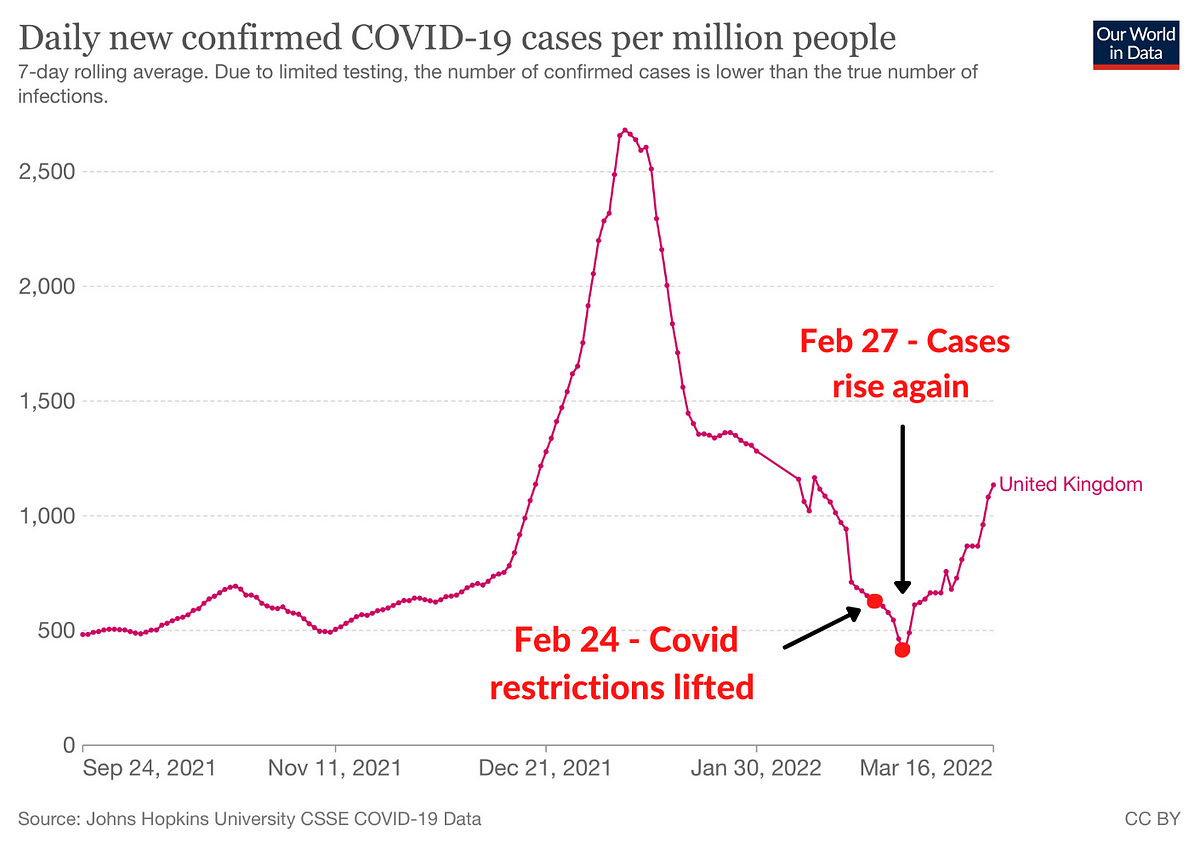2022年3月下刊
Covid is over? ;疫病下嘅同理心;Permanent DST;Disinformation in Russia;信息繭房;災難報道;Japan successful returning lost property;平反要清白;教育改革;Sanctions Don't Work;Put phones down;Statistics & Probability.
- Covid is over?

之前我自己都樂觀咗啲,睇嚟真係要瞭解清楚情況先得,只睇其他國家嘅政治決策唔一定係科學家嘅意見
簡單嚟講就係要繼續謹慎,唔好一下子取消所有行之有效嘅方案:口罩、社交距離、案例跟蹤等等;因為短暫嘅案例降低只代表現時嘅方案係有效嘅,唔代表取消之後可以繼續控制得到,而從曲線上都睇得到,後果係難以承受的,除非我哋冷血到認為嗰啲脆弱易感染嘅幼兒、長者等抵抗力差嘅人羣應該自己搞掂、自己負責
but,儘管同病毒共存係暫時唔可行嘅,但大陸嘅方案都唔係乜嘢好嘅方案,好多措施都係廢而無效嘅,為做而做,好簡單一句,因為一個人感染所以全個小區都要關起身?而家21世紀嘅中國真係咁落後嗎?而且,而家究竟要計算嗰啲因為Covid-19但又唔係因為感染而死嘅人呢?

跟住再嚟睇睇台灣如何運作,講真又真係唔使幾多高科技,只不過最難可能就係隱私問題了,畢竟已經大把多app都會侵犯了。至於要人配合方面簡直唔需要質疑,大陸高壓咗咁耐都唔見有乜嘢超級大嘅反對聲音(雖然可能係因為被404之後我睇唔到
- 疫病下嘅同理心

「这次忽然严重的疫情让我更深刻地明白“同理心”是什么意思。」
幸運同不幸係會同時發生嘅,也許自己嗰度嘅情況比較好,但唔等於其他地方一樣咁好
但,这都是,幸运。虽然在一开始看到有人说社区封了菜价贵了上海不顾居民生活一团乱的时候想告诉他:不会啊,我们就很好。
一瞬间我忽然想起,有一阵子,有一些求助的声音,在其他城市出现又消失的时候。就是有一部分人吃饱了的人,不让另一部分饿着的人说话。
保持沉默很难,必须承认世界并不是平的。有人吃饱,就有人挨饿,而吃饱的人要做的不是去告诉挨饿的人“你胡说,我就吃的很好!”
而是急他之所急,想想自己如果哪天没有这份运气而陷入挨饿境地时,需要什么。
- Permanent DST

at last,今次終於達成共識,接落來就睇眾議院是否通過或者有乜嘢修改了
不過變到有啲地區天未光就要起身返工返學嘅問題,都係一個需要考慮嘅因素,或者可以變通上班上學嘅時間
- Disinformation in Russia
所以話,都幾難避免,當資訊被管制,假消息周圍宣傳嘅時候,就會覺得真相係假嘅。有時都幾同情,因為錯嘅人唔係接受資訊嘅人,而係宣傳、限制人們得知真實情況嘅機構機器

而仲係會有希望,對人民有希望,always
- 信息繭房

重温一下信息繭房,人固有嘅處理信息嘅侷限,加上現代技術同環境
破局之法除咗自己努力,的確都可以寄希望於信息嘅整合
我都諗緊自己係咪應該睇少啲?而家感覺有啲散,而又唔算太深入,但感覺都係要睇多啲唔同方面嘅嘢,始終都係無知嘅地方多
- 災難報道

發生災難嘅時候,又會有噉嘅爭論,其實講真,可能真係因為新聞太少,所以越嚟越容易引起非議。比如話,我哋嘅新聞聯播報道其他國家嘅災難時,係帶住點樣嘅温度同感情呢?
国际记者中心(ICFJ)出品的《灾难和危机报道手册》中提出,在灾难和危机中,新闻媒体扮演了四种关键的角色:
- 第一,提供关键的信息,告诉大家发生了什么、谁受到了影响、事情在如何发展,以及为什么会发生这样的灾难。
- 第二,提供一条沟通的生命线,传递关键信息,把受影响的相关方的信息传出来,也把关键信息传递给他们;
- 第三,成为一座警告的灯塔,为避免下一次的灾难传递及时、可靠的信息;
- 第四,成为一个社区的论坛,让公民们可以走到一起来,分享自己共同的担忧,在困难的时刻彼此提供支持。
这四种角色,显然不是一篇报道能够同时承担的,甚至不是一家媒体能够同时承担的。所以,我们需要更多媒体的参与,需要更多样的声音和多元的角度,有的记者去前线采访救灾现场,有的记者挖掘调查背后的深层原因,有的媒体传递共情、抚慰心灵,让人们可以更紧密、更坚强地站在一起。在理想状态下,我们应该看到这些场面同时上演。
这里顺便再说一句媒体的“流量诉求”。大多数媒体都是按照商业规则运行的,追求注意力,不管是发行量、收视率还是点击率,都是正常的市场逻辑。纸媒年代,如果一张报纸能做到一纸风行、洛阳纸贵,那是很骄傲的事情。哪怕是非商业的公共媒体(比如BBC),也很强调报道内容是否覆盖到了更广泛的受众。所以,“追求流量”并不是原罪,关键是通过什么样的方式去追求,能否做到流量和公共价值的更好平衡,乃至双赢。一些人在媒体做了什么报道之后就骂“人血馒头”,下一次媒体没报道的时候又喊“媒体已死”,那是自相矛盾的。
我在和朋友的交流过程中,还听到了另一种批评意见,我觉得是更值得参考的。这位朋友说:这类报道“是否也陷入同质化问题,千篇一律,满篇都是‘人’,但又让我感觉不到‘人’的真实复杂的存在。这一视角不限于对这一篇的观感。”
我觉得这个批评意见相当一针见血。我们需要看到活生生的、有血有肉的人,我们期待呈现充沛而复杂的情感,但是《人物》杂志的这篇文章因为操作时间有限,其实呈现出来的整体面貌是比较单一和浅层的,或者说是高度可预测的,有经验的读者还没点开就能猜出里面大概会写什么。
所以,还原人生是重要的,但如何更好地还原,可以思考和改进。
在新闻业的空间日益逼仄的当下,对新闻伦理的讨论更应该怀着同情的理解,出发点应该是怎样鼓励和鞭策媒体做到更好,而不是捂住媒体的嘴巴。
只可惜,都係難逃被刪嘅命運;而睇到咁多支持《人物》嘅聲音,都稍微感覺寬慰
因為恢復返一週睇一次朋友圈,所以見到好多朋友分享嘅文章都睇唔到,亦都多咗幾位被暫時禁發、甚至永封公眾號嘅作者。
點講呢,都料想得到嘅,只係越嚟越可悲,未試想過呢一日咁快來到,當所有人都只係諗住活過明天嘅時候,未來仲有乜嘢希望呢?

- Japan successful returning lost property

After the tsunami that hit northeast Japan in 2011, many were left homeless, without possessions, food or water. But even in adversity, people showed fortitude to put others’ needs before theirs. Behrens likens this to the Buddhist ethos of “gaman” which is similar to patience or endurance – to think of others rather than oneself. It was widely reported in the media that there was significantly less looting in the affected areas in Japan than has been seen in similarly devastated areas in other countries.
Likewise, in Shintoism everything, from rocks to trees, possesses a spirit. While organised Shintoism is a minority practice in Japan, omniscient objects permeate the culture. This is where Behrens’s idea that Japanese people are motivated by “fear” comes from; if you are always being watched and your natural disposition is to think of others first, it is natural that you would be bothered to hand in the lost item.
The abundance of police officers and cultural traditions that prompt people to think first of others are perhaps more enlightening than any notion that the Japanese are more honest, in the eyes of Behrens and West. In any case, if you’re walking past a kōban, it might be worth popping in to say “Hi”.
本來中國都可能會係噉,只可惜……
‘societal eye’喺一啲農村仲會有嘅,只不過都越來越少;而考慮他人同與社會相處融洽,大概可以講係已經失傳咗
- 平反要清白
荒唐事還少嗎,鬥人嘅年代,隨便偽造證據罪名,睇之前以為係中國版嘅《狩獵》,結果差得更遠,更離譜嘅係,大家都知道係冤枉嘅,但法院偏偏唔平反。。。「原审被害人虽改变陈述,但其改变陈诉不能认为具有合理理由,不足以认定为新的证据。」,噉點解唔睇下原來嘅證據有幾兒戲呢???
- 教育改革
唔係第一次分享呢個話題,亦都唔係第一次分享呢個公眾號
唔知呢,見到有啲老師同同學有轉發,感覺比較唏噓。改革行唔落去,唔係佢唔可行,而只係阻力太大
只要喺大陸,就永遠走唔出呢個衡量呢種價值
如果人生真的有“输在了起跑线”这样的说法,我更想理解为输在了不能更早地了解自己的兴趣和规划自己的人生,不能更早地学习安放自己,为自己找到一个角色。
- Sanctions Don't Work
Why Sanctions Don't Work Against North Korea
最真實嘅一點:金正恩冇可能放棄可以保護自己嘅最有力武器
制裁影響最大嘅係中下層嘅人民,且好容易被官方敍事利用以強化愛國情懷同仇恨他國,而獨裁聯盟嘅存在使到制裁嘅效果變弱,再加上有利益嘅情況下總會有國家唔統一戰線。。
同今次制裁俄羅斯都差唔多,最苦嘅其實都係人民,睇睇各國因燃油漲價嘅示威羣眾,佢哋乜都冇做錯,但要承受噉嘅損失
- Put phones down

On Thursday, Feb. 24, a note appeared on indie musician Mitski’s Twitter account. “Hello!” it read. “I wanted to speak with you about phones at shows. … Sometimes when I see people filming entire songs or whole sets, it makes me feel as though we are not here together.”
It was a simple request, one that the average music fan would likely scroll by without so much as raising an eyebrow. Live music, Mitski continued, offers “the feeling of connection, of sharing a dream, and remembering that we have a brief miraculous moment of being alive at the same time.” But when her fans watch her perform live through their phone screens, she said, “it makes me feel as though those of us on stage are being taken from and consumed as content.”
feel the same,當然唔係講我上台唱歌,係覺得對手機嘅過於依賴使到人同人線下交流變得勁冇癮。熟我嘅人都知我出去嘅話好少睇手機
而佢講到嘅仲有一個,就係點樣看待藝術家及其作品?因為確實係有人只係為咗消費佢哋
Currently, the most visible of Mitski’s fans tend to see her music, and by extension her persona itself, as a cathartic vehicle for their own angst, fostering deep personal connections. Mitski is acutely aware of this relationship: “I am a musician, but the reason they really pay me the big bucks is to be the place where anybody can put all of their feelings, their ugliness, that doesn’t have a place in their own lives,” she told the Guardian in February 2022. “I’m like the black hole.”
Of course, stereotyping and minimizing entire groups of fans also minimizes the complexity and humanness of the individuals that compose these groups. Still, the most visible fans are the ones who set the tone of the fandom, and in the case of the Mitski fandom, then, the artist herself has been reduced to an emotional symbol, in order to prioritize the emotional impact she has left upon the listeners. “As happens with stars, people seem to love the idea of Mitski as much as the fact of her,” wrote Jia Tolentino in a 2018 New Yorker piece. But as with other artists often considered for their image and branding over their personhood, the idea of Mitski and the fact of Mitski are two wholly separate things, and the flattening of them into one person may be what makes Mitski’s recent Twitter backlash particularly dispiriting.
In Mitski’s case, the commodification of her persona over her personhood can divert the conversation away from her music and toward arbitrary categorizations of her identity and her fans. Mitski herself has spoken out about the consequences of commodification many times. “Every day, all the time, is exploitation,” she said in a January 2022 interview with Vulture. “You can’t be a human being. You have to be a product that’s being bought and sold and consumed, and you have to perceive yourself that way in order to function.”
無論如何,藝術家唔理會呢啲事情退出社交未嘗唔係一件好事,而亦有一部分fans係中意佢作品、其人格等等,就好好
- Statistics & Probability.
What Educated Citizens Should Know About Statistics and Probability by Jessica UTTS
最後整篇硬核內容
The consequence of all of these changes is that there is less need to emphasize calculations, and more need to focus on understanding how statistical studies are conducted and interpreted. Relevant and interesting examples are readily available. Yet many instructors have not made any changes in how they teach introductory statistics.
不能更贊同,睇睇有幾多係自己想瞭解嘅就入去睇喇,個人係比較推薦8.CONFUSION OF THE INVERSE,因為真係好容易就會冇醒起呢個,簡單嚟講就係要時刻記得係有基礎比率嘅
1. When it can be concluded that a relationshipis one of cause and effect, and when it cannot, including the difference between randomized experiments and observational studies.
2. The difference between statistical significance and practical importance, especially when using large sample sizes.
3. The difference between finding “no effect” or “no difference” and finding no statistically significant effect or difference, especially when using small sample sizes.
4. Common sources of bias in surveys and experiments, such as poor wording of questions, volunteer response, and socially desirable answers.
5. The idea that coincidencesand seemingly very improbable events are not uncommon because there are so many possibilities.
6. “Confusion of the inverse” in which a conditionalprobability in one direction is confused with the conditional probability in the other direction.
7. Understandingthat variability is natural, and that “normal” is not the same as “average.”









評論留言区